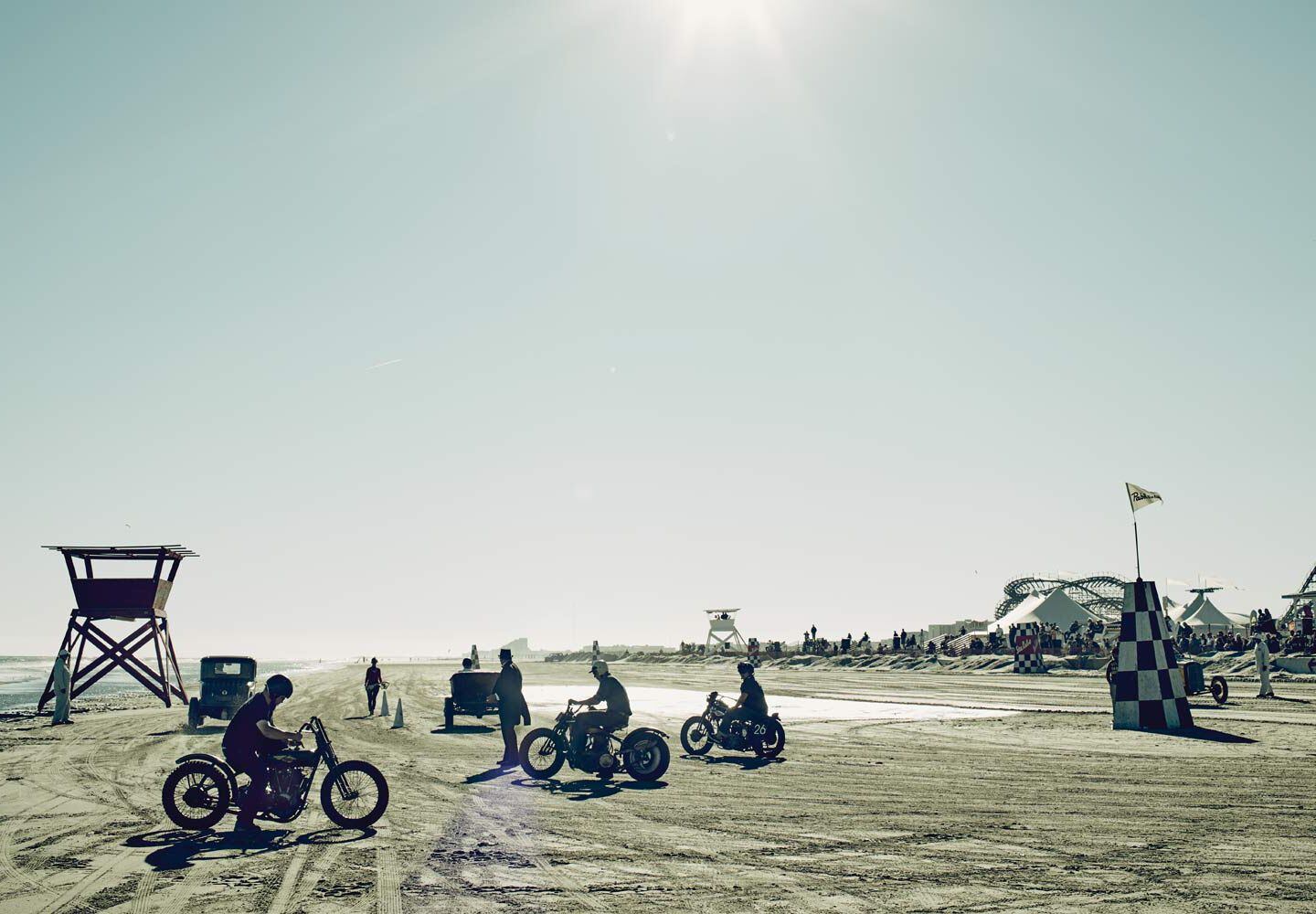Mention October 2012 to most residents of the Mid-Atlantic region and they’ll recall Superstorm Sandy, the second-costliest hurricane in American history. Yet just days before much of the Eastern Seaboard was devastated by flooding, the beach sand of Allenhurst, New Jersey, birthed a much happier event in the inaugural running of The Race of Gentlemen.
Part vintage drag race, part cosplay convention, all party, The Race of Gentlemen (TROG) attracts retro aficionados who—not content to merely park their mostly prewar American motorcycles and automobiles at a concours d'elegance or hot-rod meet—prefer to compete against one another on an eighth-mile strip of sand.
One of the most striking aspects of TROG is the degree to which it is period correct (the entry process includes uploading images of vehicles to verify suitability), and that extends beyond the machinery to the apparel of the attendees. Overalls, antique racing caps, and goggles are all common, and more than a few people wear T-shirts and jackets emblazoned with an Oilers logo, a tribute to the club that was originally established in 1947 by a group of young WWII veterans from Carlsbad, California, who were active at Bonneville. The club disbanded about a decade later but not before original president Jim Nelson helped Wally Parks form the NHRA.
Six decades and an unrecognizable world later, surfing musician Mel Stultz was inspired while reading King of the Boards, a book about 1920s race-car driver Jimmy Murphy, in his New Jersey home. "It was an engine, wheels, a frame, and a seat," Stultz recalls of the equipment used back then. "I was like, 'This is as tough as it gets!'"
Along with a few close friends, an enthusiastic Stultz revived the Oilers (with Nelson's blessing) and began organizing the inaugural The Race of Gentlemen, the name prompted by his fascination with his heroes' dress-shirt-and-tie racing attire, his respect for their word-is-bond approach to life, and a sly attempt to persuade local government officials to grant event permits. "I figured I had to pull the wool over their eyes a little bit," laughs Stultz, who wears a beard and is covered in tattoos, "so they wouldn't think it was Animal House showing up on their beach." (Stultz stresses that the club always leaves the beach in better condition than they find it.)
After year one, that beach has been Wildwood, New Jersey, as a move 100 miles south was necessitated by the damage the aforementioned storm did to Allenhurst’s sand. The new location also had a more appropriate infrastructure for the event and, although a weather-marred TROG was organized last year at California’s Pismo Beach, Wildwood is the happening’s true home, welcoming what Stultz calls his “band of mechanical gypsies” with open arms.
The Oilers have no official officers, but Stultz, who effectively serves as president, says things work out somehow. “We’re dysfunctional, but together we function well,” he explains. “Even more interesting to me than the machinery is the idea of people working together to pull things off.”
Part of what makes the event special is a mindset of not taking oneself too seriously, and that extends from the organizers to the entire TROG community. Entrants come from all over the world and represent varying professions, though many maintain at least some aspects of this retro culture in their everyday lives. Babies play in the sand while septuagenarians congratulate millennials on keeping the scene alive.
Reveling is also a big part of the TROG weekend. For the 2017 edition, which takes place June 9–11, the Oilers have planned a pre-party, a chopper party (called Night of the Troglodytes—an intentional counterbalance to the respectable “gentlemen” moniker) and a rock ’n’ roll bonfire party. Additional live music—from big band to ’60s garage rock—will play at various times over the weekend.
The range in race-machine value and condition is as broad as the entrants’ walks of life. The ratio is roughly 60/40 bikes to cars, though Stultz reckons the motorcycles are actually more popular with spectators. At least in the old days, a benefit to holding races on the beach was that when a machine caught fire, its driver could simply direct it into the waves, and brake failures were solved by steering into natural sand traps. Very often, unlikely equipment or racers line up side by side. Although Sunday is reserved for bracket racing, there’s plenty of opportunity for grudge matches between friends, clubs, family members, and even boyfriend against girlfriend. “They beat the crap out of each other in a race and then laugh and hug afterward,” Stultz says.
It’s hard to argue that Stultz and the Oilers have tapped into a sort of movement with The Race of Gentlemen, one that’s paralleled by the burgeoning scrambler/customization scene. In a society that can at times seem complex and intimidating, it’s difficult to deny the attractiveness of a time that at least seems to have been simpler. “We’ve grown away from our role models that taught us everything that we knew,” says Stultz, who wants his son to learn the same DIY lessons he was taught by his grandfathers and father. “Kids don’t even know how to tie knots anymore. What are you going to do—Google it on your smartphone while you’re falling off the roof? Maybe boys want to be men again.”











/cloudfront-us-east-1.images.arcpublishing.com/octane/JHH4EQ7EIZL6SNRJEHYK2SJVGM.jpg)
/cloudfront-us-east-1.images.arcpublishing.com/octane/NOET3EZNHVYFWWBRKQRK4PPASY.jpg)
/cloudfront-us-east-1.images.arcpublishing.com/octane/O75KVI3N3VM5R33UA2L4MMTRCA.jpg)
/cloudfront-us-east-1.images.arcpublishing.com/octane/WXUXKSQOF6L552JYD2BXEB7MQ4.jpg)
/cloudfront-us-east-1.images.arcpublishing.com/octane/6E6YRE7KB4DSI64VVEOARAJPG4.jpg)
/cloudfront-us-east-1.images.arcpublishing.com/octane/2WF3SCE3NFBQXLDNJM7KMXA45E.jpg)
/cloudfront-us-east-1.images.arcpublishing.com/octane/G4MG6OUCJNBSHIS2MVVOTPX65E.jpg)
/cloudfront-us-east-1.images.arcpublishing.com/octane/IIGGWFOTOJGB7DB6DGBXCCMTDY.jpg)
/cloudfront-us-east-1.images.arcpublishing.com/octane/QSTCM6AVEZA5JJBUXNIQ3DSOF4.jpg)
/cloudfront-us-east-1.images.arcpublishing.com/octane/U4I7G625B5DMLF2DVIJDFZVV6M.jpg)
/cloudfront-us-east-1.images.arcpublishing.com/octane/B6XD6LS6IVCQPIU6HXDJSM3FHY.jpg)
/cloudfront-us-east-1.images.arcpublishing.com/octane/ICL63FEDDRDTTMINYICCEYGMDA.jpg)
/cloudfront-us-east-1.images.arcpublishing.com/octane/FCGZHQXRBZFLBAPC5SDIQLVF4I.jpg)
/cloudfront-us-east-1.images.arcpublishing.com/octane/WNOB6LDOIFFHJKPSVIWDYUGOPM.jpg)

/cloudfront-us-east-1.images.arcpublishing.com/octane/X33NU3E525ECRHXLNUJN2FTRKI.jpg)
/cloudfront-us-east-1.images.arcpublishing.com/octane/6KKT5NNL2JAVBOXMZYS5ZO76YA.jpg)
/cloudfront-us-east-1.images.arcpublishing.com/octane/J5RKG5O455GMPGQRF2OG6LRT7A.jpg)
/cloudfront-us-east-1.images.arcpublishing.com/octane/GX2CIZKQVRH2TATDM26KFG2DAE.jpg)
/cloudfront-us-east-1.images.arcpublishing.com/octane/ZWIDYSAKQZHD5BHREMQILXJCGM.jpg)
/cloudfront-us-east-1.images.arcpublishing.com/octane/CYUHJZCTSJCH3MRAQEIKXK7SCQ.jpg)
/cloudfront-us-east-1.images.arcpublishing.com/octane/LKOFINY56FCXJCANJ5M7ZDQUBY.jpg)
/cloudfront-us-east-1.images.arcpublishing.com/octane/4NBPDACMWJH63JQYJVK3QRBDZI.jpg)
/cloudfront-us-east-1.images.arcpublishing.com/octane/KKHQHRR3FJGX7H2IPU6RALMWG4.jpg)

/cloudfront-us-east-1.images.arcpublishing.com/octane/5IOFS5JAE5FOXMNA23ZRAVVYUU.jpg)
/cloudfront-us-east-1.images.arcpublishing.com/octane/CGXQ3O2VVJF7PGTYR3QICTLDLM.jpg)

/cloudfront-us-east-1.images.arcpublishing.com/octane/OQVCJOABCFC5NBEF2KIGRCV3XA.jpg)